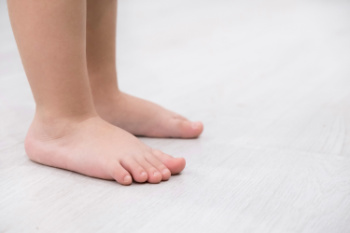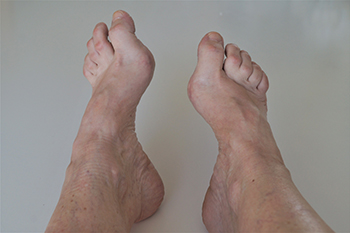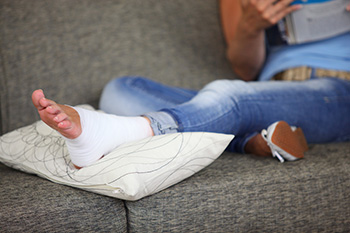
Flexible flatfoot in children occurs when the arch of the foot appears flattened during standing or walking but returns when the child is sitting or standing on tiptoe. This type of flatfoot is usually caused by laxity in ligaments and is often painless. However, some children may experience foot pain during physical activity or after long periods of standing. A podiatrist can determine whether the flatfoot is flexible or rigid through physical examination, and in some cases, digital imaging scans may be needed. Flexible flatfoot in children often improves naturally as the child matures, but treatment may be necessary if pain, fatigue, or gait abnormalities develop. In severe or persistent cases, surgery may be considered to correct deformities, especially when there is a shortened tendon or structural misalignment of the foot. If your child is complaining of foot pain that may be caused by flat feet, it is suggested that you make an immediate appointment with a podiatrist for a diagnosis and treatment options.
Flatfoot is a condition many people suffer from. If you have flat feet, contact one of our podiatrists from Parkwood Podiatry. Our doctors will treat your foot and ankle needs.
What Are Flat Feet?
Flatfoot is a condition in which the arch of the foot is depressed and the sole of the foot is almost completely in contact with the ground. About 20-30% of the population generally has flat feet because their arches never formed during growth.
Conditions & Problems:
Having flat feet makes it difficult to run or walk because of the stress placed on the ankles.
Alignment – The general alignment of your legs can be disrupted, because the ankles move inward which can cause major discomfort.
Knees – If you have complications with your knees, flat feet can be a contributor to arthritis in that area.
Symptoms
- Pain around the heel or arch area
- Trouble standing on the tip toe
- Swelling around the inside of the ankle
- Flat look to one or both feet
- Having your shoes feel uneven when worn
Treatment
If you are experiencing pain and stress on the foot you may weaken the posterior tibial tendon, which runs around the inside of the ankle.
If you have any questions please feel free to contact our offices located in Brunswick and Hinesville, GA . We offer the newest diagnostic and treatment technologies for all your foot and ankle needs.

A high arch, also known as pes cavus, occurs when the arch of the foot is excessively elevated. This condition may be inherited or linked to neurological disorders such as Charcot-Marie-Tooth disease, cerebral palsy, or spinal cord abnormalities. Symptoms include foot pain, instability, difficulty fitting into shoes, and excessive pressure on the ball and heel of the foot. High arches can lead to calluses, hammertoes, ankle instability, and an increased risk of stress fractures. Some individuals experience difficulty walking or standing for long periods due to inadequate shock absorption. In severe cases, medical intervention may be necessary to improve comfort. If you have high arches that are causing pain or discomfort, it is suggested that you contact a podiatrist who can help you to manage this condition, possibly by offering custom-made orthotics.
Foot Pain
Foot pain can be extremely painful and debilitating. If you have a foot pain, consult with one of our podiatrists from Parkwood Podiatry. Our doctors will assess your condition and provide you with quality foot and ankle treatment.
Causes
Foot pain is a very broad condition that could be caused by one or more ailments. The most common include:
- Bunions
- Hammertoes
- Plantar Fasciitis
- Bone Spurs
- Corns
- Tarsal Tunnel Syndrome
- Ingrown Toenails
- Arthritis (such as Gout, Rheumatoid, and Osteoarthritis)
- Flat Feet
- Injury (from stress fractures, broken toe, foot, ankle, Achilles tendon ruptures, and sprains)
- And more
Diagnosis
To figure out the cause of foot pain, podiatrists utilize several different methods. This can range from simple visual inspections and sensation tests to X-rays and MRI scans. Prior medical history, family medical history, and any recent physical traumatic events will all be taken into consideration for a proper diagnosis.
Treatment
Treatment depends upon the cause of the foot pain. Whether it is resting, staying off the foot, or having surgery; podiatrists have a number of treatment options available for foot pain.
If you have any questions, please feel free to contact our offices located in Brunswick and Hinesville, GA . We offer the newest diagnostic and treatment technologies for all your foot care needs.

Ankle sprains occur when the ligaments that support the ankle stretch too far or tear, often due to the sudden twisting or rolling of the foot. Recovery time for a sprained ankle varies depending on its severity. For instance, a mild ankle sprain, involving slight overstretching, may heal in one to three weeks, but a moderate sprain, which includes partial tearing of the ligaments, usually requires three to six weeks of healing. Severe sprains that involve a full tear of the ligament can take up to three months or even longer to recover, especially if surgery is necessary. Healing time can also be affected by a person's age, body weight, activity level, and any previous ankle injuries. Trying to walk on an injured ankle too soon or ignoring symptoms can prolong the recovery timetable and lead to chronic ankle instability. A podiatrist can assess the extent of the sprain, confirm the diagnosis with imaging as needed, and develop a treatment plan that protects the ankle and promotes full healing. If you have injured your ankle, it is suggested that you make an immediate appointment with a podiatrist for an exam, diagnosis, and treatment.
Although ankle sprains are common, they aren’t always minor injuries. If you need your ankle injury looked at, contact one of our podiatrists from Parkwood Podiatry. Our doctors can provide the care you need to keep you pain-free and on your feet.
How Does an Ankle Sprain Occur?
Ankle sprains are the result of a tear in the ligaments within the ankle. These injuries may happen when you make a rapid shifting movement while your foot is planted. A less common way to sprain your ankle is when your ankle rolls inward while your foot turns outward.
What Are the Symptoms?
- Pain at the sight of the tear
- Bruising/Swelling
- Ankle area is tender to touch
- In severe cases, may hear/feel something tear
- Skin discoloration
Preventing a Sprain
- Wearing appropriate shoes for the occasion
- Stretching before exercises and sports
- Knowing your limits
Treatment of a Sprain
In many cases, the RICE method (Rest, Ice, Compression, and Elevate) is used to treat ankle sprains. However, you should see a podiatrist to see which treatment option would work best with your injury. In severe cases, surgery may be required.
It is important to ask your doctor about rehab options after you receive treatment for your injury. Stretching, strength training, and balance exercises may help the ankle heal while also preventing further injury.
If you have any questions, please feel free to contact our offices located in Brunswick and Hinesville, GA . We offer the newest diagnostic and treatment technologies for all your foot care needs.

